Can Meditation Cure My Insomnia?

“And, you know, with the continual responsibility of having 127 people on the road, and always being the point person for everything, my subconscious is going even when I’m sleeping. I’m dreaming about whatever I’m creating next, or relationships, or blah, blah, blah. So I’m never really off. And meditation is actually the one time I get to really reset.”
~Katy Perry, singer & songwriter
So, can meditation cure my insomnia?
Well, it depends on who you ask.
The truth is meditation may not cure your insomnia, but it will definitely improve it.
Tossing and turning all night is not only frustrating and physically taxing, but it’s also terrible for your mental health and productivity. And, if insomnia has caused you to be up at all times of the night several nights in a row, eventually you’ll find yourself at your wits end, desperate for a modicum of relief. At this point, you are probably willing to try anything to get some sleep.
Perhaps, you made an appointment with your doctor in a quest for prescription sleep aids. Or, maybe, you scheduled a consultation with a psychologist to help you determine what’s preventing you from falling and staying asleep at night. Not to mention you’ve probably tried every home remedy for insomnia that you could find with little-to-no luck.
You’ve tried reading, taking a warm bath or shower, listening to soft music – counting sheep, but nothing has worked! You may have tried a lot of things to help you sleep, but one thing you most likely haven’t tried is meditation. The good news is some insomniacs have found some much-needed relief through meditation.
Content
What is Meditation?
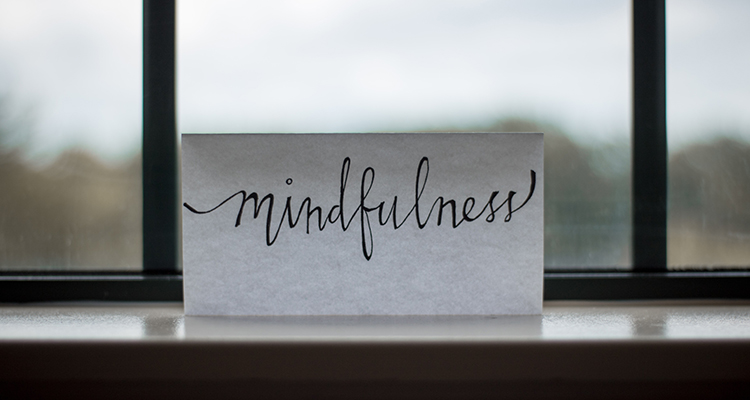
Meditation, also referred to as mindfulness and mindful meditation, is a mind/body exercise (a heightened awareness and focus) designed to reduce or eliminate the upsetting thoughts, images, and feelings that are preventing you from focusing on your breathing and sensations – what you are hearing, smelling, feeling, seeing, and tasting. Meditation blocks-out the negativity, so you can relax and enter the “here-and-now.”
Meditation trains your mind to focus on what is currently happening around you. The purpose of the practice is to calm you, so you can relax, rest, and/or fall asleep. Its aim is to center you and balance your hormones, so you can successfully cope with adversity (i.e. illnesses and disabilities, stress, anxiety, depression, dysfunctional relationships, insomnia, job issues, etc.). Thus, it is typically used to improve your overall health and well-being. Thereby, meditation explores the connection between your mind, body, and behavior.
According to a 2017 National Health Interview Survey (NHIS), the number of American adults, who used meditation to combat stress and pain and/or reduce insomnia, almost tripled between 2012 and 2017 (from 4% in 2012 to 14% by 2017). Meditation use even rose amongst American children, ages 4 to 17, during this time (from .6% in 2012 to 5% by 2017).
One of the benefits of meditation is it can be practised in a variety of locations, such as an empty conference room or deserted break room at work, your car, your bedroom, a closet or bathroom, etc. All that is required is a quiet spot that offers little-to-no stimulation or distractions, a comfortable position (i.e. sitting up, lying down, standing up, etc.), a point of focus (this can be in your breathing, mind, sensations, a word or phrase, and/or an actual object or image), and a positive attitude.
How long is a typical meditation session?

Because the primary goal of meditation is to help you achieve a heightened awareness and focus, the process can be disconcerting at first. Thus, in the beginning, sessions may only last 3-5 minutes. However, over time, the length of the sessions may increase to 10-30 minutes. It is important to understand that the amount of time you spend meditating is not as important as the ability to mediate consistently (regularly or at a set time each day or night). The good news is the benefits of meditation can be received in as little as 10 minutes a day.
Is meditation beneficial?
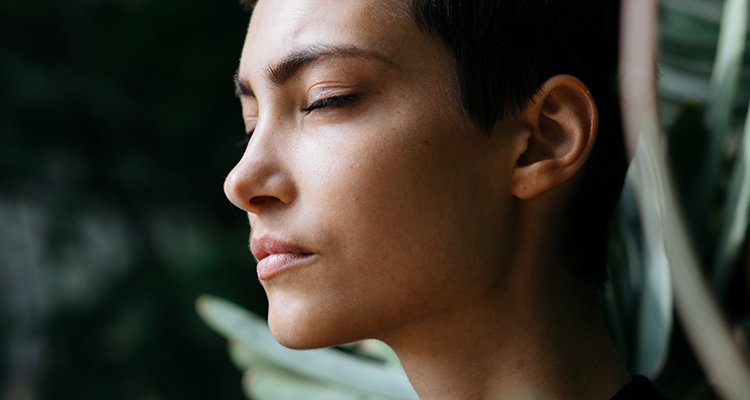
Yes!
According to researchers, meditation offers a host of potential benefits, such as lower levels of anxiety, stress, pain, depression, and insomnia. Some studies suggest that meditation could also be beneficial for people suffering from diabetes, lupus, breast cancer, fibromyalgia, and irritable bowel syndrome (IBS). Research indicates that it may even help prevent age-related cognitive decline, aid in smoking cessation, and improve high blood pressure.
Should I try meditation for my insomnia?
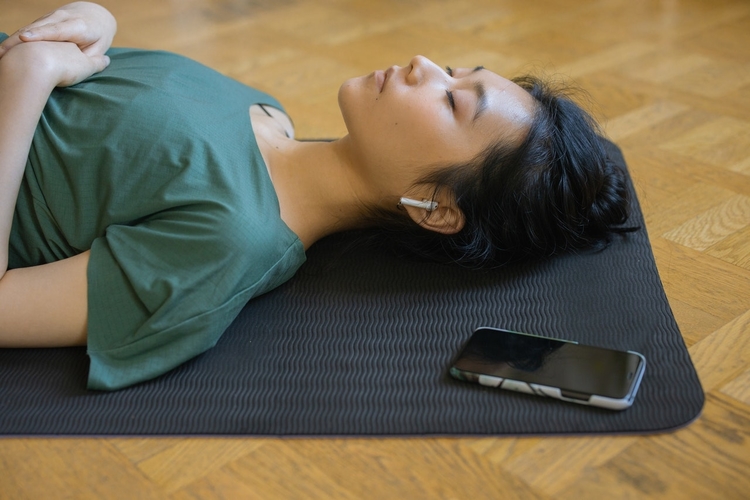
Insomnia isn’t something you can make disappear on your own, because the thoughts, images, and feelings spurring the insomnia can be stubborn. The more you try to eliminate or suppress them, the more persistent and noisier they become. This makes it nearly impossible to think clearly, relax, or sleep. Meditation helps your mind focus on the “here-and-now.” More specifically, it removes the annoying chatter inside of your mind – chatter that is preventing you from getting sound sleep. In fact, studies indicate that it only takes about 10-30 minutes to ease anxiety and depression and trigger relaxation and sleep.
What is the relationship between meditation and insomnia?

Studies suggest that meditation can balance and calm your mind, so you can peacefully fall asleep. Researchers also found that falling asleep involves a gradual reduction in arousal, while insomnia involves a quick increase in arousal, a state often referred to as “hyperarousal.”
Understand that when you become stressed, depressed, or anxious; your brain becomes “hyper-stimulated” or “overly wired,” preventing your mind and body from “wearing-down” so you can fall asleep. If this occurs enough times, your mind begins to associate sleep with anxiety, distress, and sadness about being unable to fall and stay asleep all night long. This creates a never-ending cycle of fear/depression and insomnia.
Research indicates that meditation can ease emotional distress and improve reflection or thinking and emotion regulation (the ability to control or manage your emotions). And, according to a 2018 study, meditation can help people with fibromyalgia better manage their anger, worry, anxiety, and depression. Thus, researchers have concluded that meditation may help enhance sleep quality by providing insomniacs with a safe, natural sleep aid that relaxes their mind and body in preparation for sleep.
Sleep experts theorize that meditation promotes sound sleep by decelerating your heart rate, slowing your breathing, and reducing your cortisol levels (the stress hormone). And, study results indicate that at the biological level, relaxation slowly reduces oxidative stress and inflammation, while increasing your insulin resistance.
However, researchers are still exploring the relationship between meditation and sleep. Yet, studies imply that meditation can produce long-term changes in your brain – changes that could help you get some sleep. In fact, a 2016 study suggests that nightly meditation may increase an insomniac’s slow-wave and REM sleeps and helps him or her experience fewer night awakenings.
Is meditation beneficial for insomnia?
Yes, meditation can be extremely beneficial for insomnia.

Studies suggest that meditation may reduce “sleeplessness,” and improve sleep quality for people with or without existing sleep conditions or issues. Researchers also found that meditation may reduce daytime sleepiness in both older adults and those, who suffer from persistent insomnia.
Thus, research suggests that over time meditation is just as effective as, if not more effective than, traditional sleep aids, such as sleeping pills. Keep in mind that the primary goal of meditation, similar to other sleep aids, is to help you “de-stress” so you can get the rest you need to function properly the next day.
Are there different types of meditation?
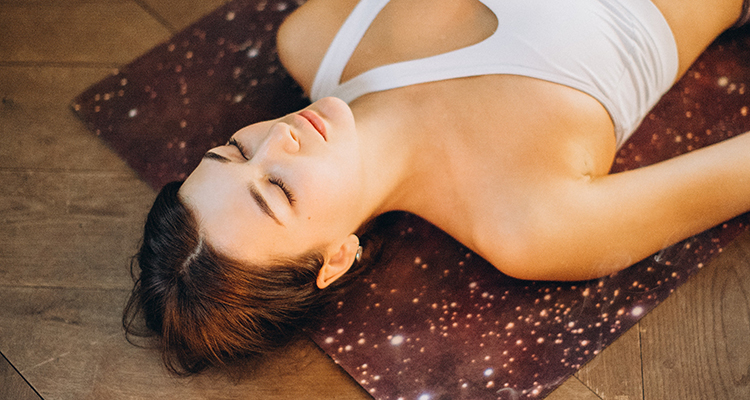
Yes, in fact, there are 8 types of meditation.
Listed below are the various types of meditation:
Mindful Meditation
Mindful meditation is a focus and awareness technique that stems from Buddhist teachings and is popular throughout the world. Mindful meditation or simply mindfulness involves paying close attention to the thoughts that pop into your mind. With this technique you refrain from becoming too involved or judgmental towards your thoughts. Opting instead to observe your thoughts and identify any patterns inherent in them.
Mindful meditation combines focus with awareness to help you enter a higher, calmer, and more balanced state-of-mind. But, for this technique to be successful, you must train your brain to focus on your breathing, while observing your thoughts, feelings, and sensations, as a bystander. This type of meditation can relax and center you before bed, so you can peacefully fall asleep once your head hits the pillow.
Focused Meditation
Focused meditation also involves bodily sensations (hearing, seeing, feeling, hearing, and tasting). An example of focused meditation is counting sheep, beads or coins, listening to a steady musical beat (i.e. cymbal, drum, or gong), or staring at a rotating fan or a flickering flame. Although this may appear to be an easy practice, this form of meditation can be tricky for beginners, primarily because maintaining your attention for longer than a minute or two can be difficult when you’re not used to it.
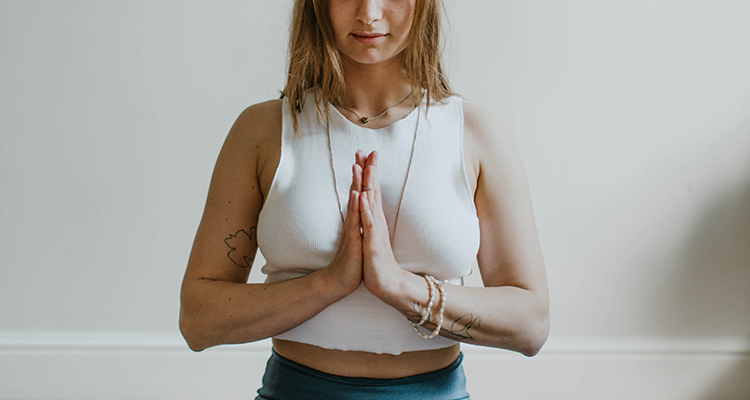
Mantra Meditation
Mantra meditation uses words, sounds, or phrases to remove unnecessary noise from your mind. Popular mantras used in meditation are: Om, Aum, Om Shanti, Ham-Sah, Peace, Abundance, Love, Forgive, “I am that I am,” “May I be happy.” “May I be well.” “May I be safe.” Or, “May I be peaceful.”
It does not matter if you say your mantra aloud or silently. The goal is to chant the mantra until you experience calmness, balance, and peace – an “oneness” or “awareness” with the world around you, rather than with the thoughts and images in your mind. Repeating the mantra over and over again can clear your mind and help your body relax, so you can get some much-needed zzz.
Visualization Meditation
Visualization meditation involves focusing on your breathing, while visualizing or imagining calm, peaceful, relaxing, and stress-free feelings, situations, images, thoughts, and scenes or environments. The key to making this meditative technique work is using your senses to add depth and vibrancy to the images, feelings, and thoughts floating through your mind.
Visualization can help you get sound sleep at night by encouraging you to “see” yourself or imagine yourself sleeping peacefully throughout the night. Visualizing yourself happily sleeping can also improve your mood, lower your stress level, and encourage a peaceful state-of-mind.
Progressive Relaxation
Progressive relaxation involves easing tension and encouraging relaxation. Generally, this type of meditation consists of gradually tightening and then relaxing one muscle group at a time. It may also include imagining or visualizing waves or ripples flowing through your body to help “release” the tension. This meditative technique is especially beneficial for people, who suffer from insomnia because it helps reduce your stress and relax your muscles, so you fall asleep without pain.

Guided Imagery
Guided imagery is similar to visualization in that it supports imagining or visualizing a goal (which in this case is restful sleep). Both meditative techniques encourage you to think about peaceful feelings, scenes, experiences, etc. Guided imagery is different in that it is a guided process, which means you are prompted to think about a certain scene or image, as compared to visualization, which is considered unstructured or unguided.
Many times, guided imagery involves video or audio recordings to help you visualize a calm and happy feeling, image, or place. Online sleep programs, like Somnus Therapy, use cognitive-behavioral therapy for insomnia (CBT-I) and guided imagery to help clear your mind, balance your mood, and promote sound sleep.
Deep Breathing
Sometimes, deep breathing can relax you enough to fall asleep at night. Deep breathing involves using your diaphragm or lungs to trigger calmness and relaxation. A common deep breathing exercise used to encourage sleep is the 4/7/8 breathing sequences. This exercise involves slowly breathing in (inhaling) for 4 seconds, holding that breath for 7 seconds, and then breathing out (exhaling) for 8 seconds. Deep breathing not only helps ease the tension and stress you are feeling, it also helps remove the annoying chatter from your mind – chatter that is keeping you up at night.
Movement Meditation
Movement meditation typically involves moving your body in calm and peaceful ways. In fact, researchers suggest movement exercises like yoga and tai chi can improve sleep quality in both insomniacs and non-insomniacs.
Keep in mind that movement mediation should be performed during the day and not right before bed. The aim of this meditative technique is to get you moving during the day so you are sleepy at night. And, although cardio exercises are extremely beneficial for this purpose, quieter and calmer exercises and movements are just as effective.
Are there any tips I can use to make meditation for insomnia more effective?

Yes, there are some things you can do to enhance the meditative benefits for insomnia.
Listed below are tips on how to get the most out of meditation for insomnia:
- Select a calm, distraction-free zone and comfortable position (bed, couch, a mat on the floor, etc.) to meditate.
- Change into comfortable clothes, such as pajamas, sweats, or a night shirt or gown.
- Turn-off the lights, television, radio, tablet, computer, smartphone, and close the door -unless you are using one of these devices for the audio or visual guided imagery or visualization. Then, these devices are permitted – but only for meditative purposes. If you are using a device for meditation, turn-off the notifications, dim the screen light, and lower the volume. If you live with other people inform them that you are about to meditate and do not want to be disturbed or place a “Do Not Disturb” sign outside of the door to alert people to stay away.
- Make sure the room is not too cold or too hot. And, try to keep the room as quiet as possible.
- Then, get into position and begin the session.
Is there anything I should be aware of before using meditation to help me sleep?

Although meditation is practically free of side-effects, there are some things you should be aware of before using meditation to help you sleep, such as:
- Some meditative techniques can cause slight muscle stiffness. Thus, movement meditation may not be advised for people with arthritic, muscle, or debilitative conditions. Consult your doctor, if you are being treated for muscle or joint condition.
- Some meditative techniques may trigger or aggravate anxiety and depression symptoms, although this is extremely rare.
- Meditation is not a cure for insomnia, sleep disorders, or medical conditions, like restless leg syndrome or sleep apnea. Although there is evidence that meditation may alleviate or reduce some of the symptoms associated with these conditions. Consult your doctor before engaging in meditation.
- Understand that meditation may not work for you. Meditative techniques require patience and practice, so it may take several tries before you become comfortable with and reap the benefits of it. Moreover, researchers have found that some types of meditation can lead to hyperarousal before bed, so those meditative techniques should not be used for sleep.
Summary
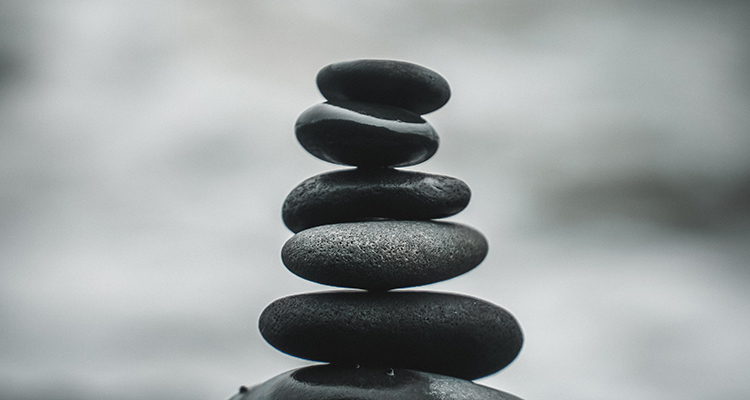
Research suggests that meditation offers a wide-range of benefits for both insomniacs and non-insomniacs by releasing tension, easing stress and pain, and clearing the mind of unnecessary, annoying, and noisy babble – babble that is preventing you from falling asleep and returning to sleep once awakened. Although meditation is by no means a cure-all for sleep problems, there is evidence that it can gradually reduce your symptoms. Repetition, patience, and practice are required to reap the full benefits of this technique. Still, after staying up night-after-night, meditation may be the reprieve you’ve been desperately seeking. In other words, meditation may be the key to getting a good night’s rest – one you haven’t had in a very long time.
References
- National Center for Complementary and Integrative Medicine (NIH). (2017). National health interview survey. Retrieved from https://www.nccih.nih.gov/research/statistics/nhis/2017
- Black, D. S., O’Reilly, G. A., Olmstead, R., Breen, E. C., & Irwin, M. R. (2015). Mindfulness Meditation and improvement in sleep quality and daytime impairment among older adults with sleep disturbances: A randomized clinical trial. JAMA Internal Medicine,175(4), 494–501. Retrieved from https://jamanetwork.com/journals/jamainternalmedicine/fullarticle/2110998
- Ong, J. C., Manber, R., Segal, Z., Xia, Y., Shapiro, S., & Wyatt, J. K. (2014). A randomized controlled trial of mindfulness meditation for chronic insomnia. Sleep, 37(9), 1553-63. Retrieved from https://pubmed.ncbi.nlm.nih.gov/25142566/
- Barrett, B., Harden, C. M., Brown, R. L., Coe, C. L., & Irwin, M. R. (2020). Mindfulness meditation and exercise both improve sleep quality: Secondary analysis of a randomized controlled trial of community dwelling adults. Sleep Health, 6(6), 804-813.Retrieved from https://pubmed.ncbi.nlm.nih.gov/32448712/
- Bottaccioli, A. G., Bottaccioli, F., Carosella, A., Cofini, V., Muzi, P., & Bologna, M. (2020). Psychoneuroendocrinoimmunology-based meditation (PNEIMED) training reduces salivary cortisol under basal and stressful conditions in healthy university students: Results of a randomized controlled study. Explore (NY), 16(3), 189-198. Retrieved from https://pubmed.ncbi.nlm.nih.gov/31982328/
- Amutio, A., Franco, C., Sánchez-Sánchez, L. C., Pérez-Fuentes, M. D. C., Gázquez-Linares, J. J., Van Gordon, W., & Molero-Jurado, M. D. M. (2018). Effects of mindfulness training on sleep problems in patients with fibromyalgia. Frontier Psychology, 9, 1365. Retrieved from https://pubmed.ncbi.nlm.nih.gov/30147666/
- Greeson, J. M., Zarrin, H., Smoski, M. J., Brantley, J. G., Lynch, T. R., Webber, D. M., Hall, M. H., Suarez, E. C., & Wolever, R. Q. (2018). Mindfulness meditation targets transdiagnostic symptoms implicated in stress-related disorders: Understanding relationships between changes in mindfulness, sleep quality, and physical symptoms. Evidenced-Based Complementary Alternative Medicine. Retrieved from https://pubmed.ncbi.nlm.nih.gov/29861769/
- Lau, W. K. W., Leung, M. K., Wing, Y. K., & Lee, T. M. C. (2017). Potential mechanisms of mindfulness in improving sleep and distress. Mindfulness (NY), 9(2), 547-555. Retrieved from https://pubmed.ncbi.nlm.nih.gov/29599851/
- Ong, J. C., Ulmer, C. S., & Manber, R. (2012). Improving sleep with mindfulness and acceptance: a metacognitive model of insomnia. Behavioral Res Therapy, 50(11), 651-60. Retrieved from https://pubmed.ncbi.nlm.nih.gov/22975073/
- Luberto, C. M., Hall, D. L., Park, E. R., Haramati, A., & Cotton, S. A. (2020). Perspective on the Similarities and Differences Between Mindfulness and Relaxation. Glob Adv Health Med, 9, 2164956120905597. Retrieved from https://pubmed.ncbi.nlm.nih.gov/32076580/
- Bhasin, M. K., Dusek, J. A., Chang, B. H., Joseph, M. G., Denninger, J. W., Fricchione, G. L., Benson, H., & Libermann, T. A. (2013). Relaxation response induces temporal transcriptome changes in energy metabolism, insulin secretion and inflammatory pathways. PLoS One, 8(5), e62817. Retrieved from https://pubmed.ncbi.nlm.nih.gov/23650531/
- Maruthai, N., Nagendra, R. P., Sasidharan, A., Srikumar, S., Datta, K., Uchida, S., & Kutty, B. M. (2016). Senior vipassana meditation practitioners exhibit distinct REM sleep organization from that of novice meditators and healthy controls. Int Rev Psychiatry, 28(3), 279-87. Retrieved from https://pubmed.ncbi.nlm.nih.gov/27055575/
- Dentico, D., Ferrarelli, F., Riedner, B. A., Smith, R., Zennig, C., Lutz, A., Tononi, G., Davidson, R. J. (2016). Short meditation trainings enhance non-REM sleep low-frequency oscillations. PLoS One, 11(2), e0148961. Retrieved from https://pubmed.ncbi.nlm.nih.gov/26900914/
- Van Cauter, E. (2011). Sleep disturbances and insulin resistance. Diabetic Medicine, 28(12), 1455-62. Retrieved from https://pubmed.ncbi.nlm.nih.gov/21950773/
- Gulec, M., Ozkol, H., Selvi, Y., Tuluce, Y., Aydin, A., Besiroglu, L., & Ozdemir, P. G. (2012). Oxidative stress in patients with primary insomnia. Prog Neuropsychopharmacology Biol Psychiatry, 37(2), 247-51. Retrieved from https://pubmed.ncbi.nlm.nih.gov/22401887/
- Psychology Today. (2021). Emotion regulation. Retrieved from https://www.psychologytoday.com/us/basics/emotion-regulation
- Lavretsky, H. & Newhouse, P. (2012). Stress, inflammation, and aging. American Journal of Geriatric Psychiatry, 20, 729-33. Retrieved from https://www.researchgate.net/publication/230637749_Stress_Inflammation_and_Aging
- Bertone. H. J. (2020). Which type of meditation is right for me? Healthline. Retrieved from https://www.healthline.com/health/mental-health/types-of-meditation
- Wang, F., Eun-Kyoung Lee, O., Feng, F., Vitiello, M. V., Wang, W., Benson, H., Fricchione, G. L., & Denninger, J. W. (2016). The effect of meditative movement on sleep quality: A systematic review. Sleep Med Review, 30, 43-52. Retrieved from https://pubmed.ncbi.nlm.nih.gov/26802824/
- Raypole, C. (2020). Have trouble meditating? Try mantra meditation. Healthline. Retrieved from https://www.healthline.com/health/mantra-meditation
- Raypole, C. (2020). 5 visualization techniques to add to your meditation practice. Healthline. Retrieved from https://www.healthline.com/health/visualization-meditation
- Scott, E. (2020). How to start a focused meditation practice. Very Well Mind. Retrieved from https://www.verywellmind.com/practice-focused-meditation-3144785
- Mayo Clinic. (2021). Mindfulness exercises. Retrieved from https://www.mayoclinic.org/healthy-lifestyle/consumer-health/in-depth/mindfulness-exercises/art-20046356
- Nunez, K. (2020). The benefits of progressive muscle relaxation and how to do it. Healthline. Retrieved from https://www.healthline.com/health/progressive-muscle-relaxation
- Gotter, A. (2018). What is the 4-7-8 breathing technique? Healthline. Retrieved from https://www.healthline.com/health/4-7-8-breathing
- Yun, M. R., Song, M., Jung, K. H., Yu, B. J., & Lee, K. J. (2017). The effects of mind subtraction meditation on breast cancer survivors’ psychological and spiritual well-being and sleep quality: A randomized controlled trial in South Korea. Cancer Nurs, 40(5), 377-385. Retrieved from https://pubmed.ncbi.nlm.nih.gov/27819804/
- Varghese, M. P., Balakrishnan, R., & Pailoor, S. (2018). Association between a guided meditation practice, sleep and psychological well-being in type 2 diabetes mellitus patients. J Complement Integrative Medicine,15(4). Retrieved from https://pubmed.ncbi.nlm.nih.gov/30024853/
- Goyal, M., Singh, S., Sibinga, E. M., Gould, N. F., Rowland-Seymour, A., Sharma, R., Berger, Z., Sleicher, D., Maron, D. D., Shihab, H. M., Ranasinghe, P. D., Linn, S., Saha, S., Bass, E. B., & Haythornthwaite, J. A. Meditation programs for psychological stress and well-being: A systematic review and meta-analysis. JAMA Intern Medicine, 174(3), 357-68. Retrieved from https://pubmed.ncbi.nlm.nih.gov/24395196/
- Kozasa, E. H., Tanaka, L. H., Monson, C., Little, S., Leao, F. C., & Peres, M. P. (2012). The effects of meditation-based interventions on the treatment of fibromyalgia. Curr Pain Headache Rep,16(5), 383-387. Retrieved from https://pubmed.ncbi.nlm.nih.gov/22717699/
- Gard, T., Hölzel, B. K., & Lazar, S. W. (2014). The potential effects of meditation on age-related cognitive decline: A systematic review. Ann N Y Acad Science, 1307, 89-103. Retrieved from https://pubmed.ncbi.nlm.nih.gov/24571182/
- McGreevey, S. (2015). Meditation may relieve IBS and IBD. The Harvard Gazette. Retrieved from https://news.harvard.edu/gazette/story/2015/05/meditation-may-relieve-ibs-and-ibd/
- Rich, S. (2018). Can meditation help reduce fibromyalgia pain? New Life Outlook Fibromyalgia. Retrieved from https://fibromyalgia.newlifeoutlook.com/meditation-for-fibromyalgia/
- Lupus Foundation of America. (2021). Learn to soothe chronic pain with mindfulness meditation. Retrieved from https://www.lupus.org/resources/learn-to-soothe-chronic-pain-with-mindfulness-meditation
- Britton WB, Haynes PL, Fridel KW, Bootzin RR. Polysomnographic and subjective profiles of sleep continuity before and after mindfulness-based cognitive therapy in partially remitted depression. Psychosom Med. 2010 Jul;72(6):539-48. Retrieved from https://pubmed.ncbi.nlm.nih.gov/20467003/
- Somnus Therapy. (2021). Sleep therapy at home. Retrieved from https://somnustherapy.com/
- Martires, J., & Zeidler, M. (2015). The value of mindfulness meditation in the treatment of insomnia. Curr Opin Pulm Medicine, 21(6), 547-52. Retrieved from https://pubmed.ncbi.nlm.nih.gov/26390335/
















